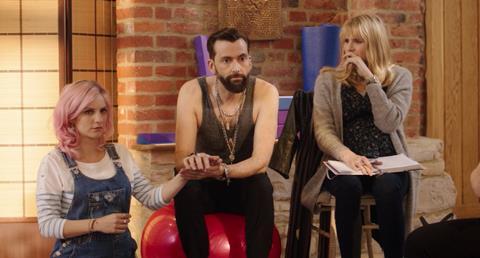David Tennant, Lucy Punch and Faye Marsay star in a broadly-sketched comedy about a lesbian couple’s pregnancies

Dir. Daisy Aitkens. UK. 2017. 98 mins.
Through a combination of covert fertility treatment and a drunken assignation with a male neighbour, a lesbian couple find themselves both pregnant at the same time. The stress that this puts on the relationship – forty-year-old Olivia (Lucy Punch) begrudges the relatively easy accidental pregnancy enjoyed by her younger girlfriend Alex (Faye Marsay) – is compounded by the efforts by John (David Tennant), the father of Alex’s child, to become part of the family. Despite the focus on a non-traditional family unit, there is little that feels new in this broadly sketched bittersweet comedy drama. However an unexpected tragic twist in the story gives some emotional weight to an otherwise inoffensive but also insubstantial tale.
David Tennant deploys brash charisma and a man-bun in a role which teeters on the brink of caricature
The presence in the cast of television stalwarts Tennant (Doctor Who), Punch (Motherland) and Marsay (McMafia, Game Of Thrones), together with the film’s breezy approach suggests that this is a project which might work most comfortably on a small screen. Distribution through streaming platforms seems likely to be the most effective route to connect You, Me And Him to potential audiences after its premiere in Glasgow, with Tennant’s casting representing the film’s most effective marketing tool. The first feature feature from actress turned writer/director Daisy Aitkens, the film was produced by Georgia Moffett, the wife of Tennant and daughter of Peter Davison and Sandra Dickinson, both of whom appear in cameos.
Perhaps the main problem in a film which is hard to dislike, but equally a struggle to care about, is the misuse of Lucy Punch. A gifted comedienne with a talent for pushing the humour of a scene into moments of prickly discomfort, here she is effectively playing a straight woman. Olivia is a lawyer from a comfortably affluent family. And although the screenplay makes a point of underlining the odd-couple status between uptight Olivia and her pink-haired, stoner, struggling artist girlfriend, the chemistry simply isn’t there. It’s a struggle to buy them as friends, let alone as lovers.
Tennant meanwhile deploys brash charisma and a man-bun in a role which teeters on the brink of caricature. John is dismissed as ‘the man evolution forgot’ by Olivia, but, softened by impending parenthood, travels an arc which redeems him slightly in the eyes of the audience, and, eventually, even those of Olivia.
Aitken’s screenplay laughs in the face of bigotry and insensitivity. “Who’s the man?” asks one male colleague of Olivia. She assures him that neither one needs to role play as a bloke in order for the relationship mechanics to work. “We are literally two women,” she answers firmly, but even so, he doesn’t seem convinced. More toxic is Alex’s mother’s opinion that “Two women raising a child together is fucking disgusting.” Even so, for all its theoretically unsensational approach to LGBTQ parenthood, the film is not above using gay anxiety in a straight male character as a recurring gag. Despite the lesbian protagonists, this is not, it’s fair to say, a film which feels as though it was tailored to connect with the LGBTQ community. It’s more likely to resonate with the LGBTQ community’s mums.
Production company: Big Blue Thumb Productions
International sales: Double Dutch International,

Producers: Georgia Moffett, Phin Glynn
Screenplay: Daisy Aitkens
Cinematography: Tony Coldwell
Editor: Gary Dollner
Music Jack Goldstein
Production Design: Anthony Neale
Main cast: David Tennant, Faye Marsay, Lucy Punch, Sarah Parish, David Warner, Gemma Jones, Simon Bird, Peter Davison
























